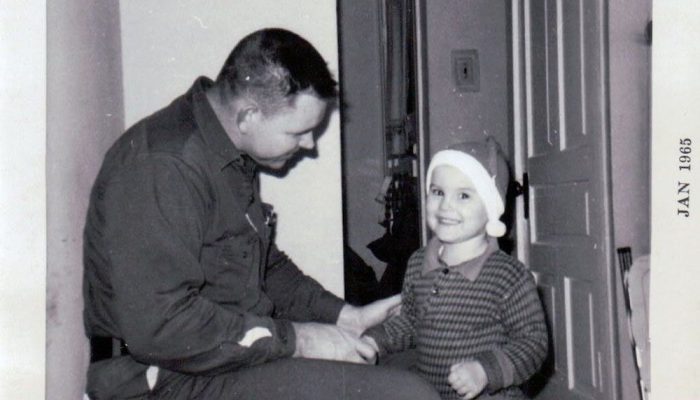It was the longest night of my life.
A night filled with surreal and phantasmagorical sights. A night that I only wanted to be over, and yet one that I surely will never forget.
My 86-year-old father had just been transferred to the hospice after suffering a series of irrecoverable strokes in the hospital. I had volunteered to come to the hospice to talk to the staff and get him settled.
Being that it was a Saturday night, however, the transfer hadn’t gone smoothly and the weekend staff at the hospice lacked basic information as to my father’s condition, his diagnosis, and his medications. All they knew was that he was delirious and agitated and surprisingly strong, despite his weakened state. He insisted he had been kidnapped—“shanghaied” was the word he used—and he would not stay in bed and kept trying to rip out his catheter.
The head nurse confided to me that my father would need constant supervision and they just were not set up for that. She suggested that a family member stay by his bedside through the night until the head doctor had a chance to examine him in the morning.
The recliner in the room turned into a daybed, she said, showing me how it worked. They brought me sheets and a pillow. In the meantime, they gave my father a cocktail of medications to knock him out so he would sleep.
So as darkness fell outside the room window, I settled in for what I thought would be an uncomfortable night on a makeshift daybed. But it turned out to be much more than that.
The medications put my father in a short-lived stupor, but within a half an hour he was back at it, trying to pull out his catheter and get out of bed.
“I have to go the bathroom.”
“You can’t, Dad. You have a catheter.”
“What’s a catheter?”
“It’s there so you don’t have to use the bathroom.”
“My leg’s caught! I need to get rid of this wire…”
“Don’t pull on that, Dad. You need to stay in bed.”
“I have to go!”
I wrestled to keep him in bed as he fought wildly against the ties that bound him. I was amazed at how strong he was, despite being emaciated. His wiry arms reached for the bedrails; his bony legs twisted toward the edge of the bed. It took all of my strength to keep him down.
The night nurse came back in to give him another vial of medications. He settled down. I lay down in the daybed, hoping to get a little sleep, but soon my father was at it again, trying to yank out his catheter and get out of bed, and I leapt up to wrestle him down again.
And so it went through that long and exhausting night. Every time I thought he had settled down and I would get into bed and close my eyes, he was up and at it again, trying to gain his freedom like Chief Bromden in “One Flew Over the Cuckoo’s Nest.”
My father was not a man who liked to be held down. He always had an independent spirit, born of his Scottish heritage, and would rage against anyone who was trying to tell him what to do or pull something over his eyes.
But here at last was a battle he was not going to win. It was a battle against the forces of age and death that were keeping him tied to his deathbed. As the night went on and he lost every battle to win his freedom, his confusion and delirium grew.
What I saw that night were the efforts of an exhausted and medicated mind to make sense of where he was and what he was doing there. The hospice room became the shop at the electronics plant where he had worked for years as an electrical engineer. The drop tiles on the ceiling were semiconductors. The circles in the tiles were silicon wafers. The television across the way was a computer.
I was alternatively his middle son Jim, or Joe or George, two buddies he had worked with at the plant decades ago. He spoke of ingots and manufacturing orders that needed to be filled. He spoke of needing to get home to his family, and then he was fighting to get out of bed again.
“Dad, you can’t get up.”
“Why are you holding me down, George? This is untenable. I have a family. I haven’t seen my wife in three days.”
Fragments of his past were floating through the room like shards of paper, and his engineer mind was trying best as it could to piece them together. At one point late in the night, the bed he was lying in became a roof. The bed rail was a ladder. He and I were 40 feet up in the air working on the farmhouse roof, and now it was time to come down.
“You go first, Jim,” he said. “Be careful. Take one step at a time.”
I thought of all of the times growing up that my brothers and I had helped him work on the roof of our old farmhouse, how concerned he was about us going up and down the ladder. Even to the end, he was my father, trying to take care of me.
“Dad, we’re not on the roof. You’re in bed…”
“Okay, you down? Now hold the ladder as I come down. Let me square up.”
He worked himself up to all fours and started to lift a leg over the rail. It took all of my strength to wrest his hand from the rail and turn him onto his back again. In the process of being flipped over, he bumped his head on the rail and lay dazed and baffled.
“This is untenable. I have to get home. I haven’t seen your mother in three days.”
To the end, he was most concerned about his family, his wife, his kids, his responsibilities.
The endless night wore on. It seemed morning would never come. There was no rest for either one of us. Again and again, I wrestled him down when he tried to get up. Eventually I gave up on the idea of getting any sleep and just knelt by the bedside so I could monitor him and push down his legs when they tried to sneak over the rail.
As I knelt there looking at his wasted body and listening to his nonsense talk, I thought on how I had wrestled with this man my entire life. His influence. His sayings. His example. He was not always the easiest man to live with when I was young. He could be negative and would often get frustrated by his lack of money and time to do what he wanted.
At times his frustration would boil over into anger and he would curse inanimate objects as if they were alive and conspiring against him. It drove me crazy at times. I saw the way his frustration would affect my mother, who was a sensitive soul like me, and I swore when I grew up I would not be like him in that way.
And how he pushed and challenged us at times. Exhorting his six children to not conform to peer pressure and the ways of the crowd, but to think for ourselves. To be individuals. To excel.
Not otherwise a literary man, he would go around the house quoting Henry Wadsworth Longfellow:
“Be not like dumb, driven cattle. Be a hero in the strife. For the soul is dead that slumbers.”
And then I grew up and became a father myself and I realized how much pressure he was under during those years, especially when the electronics plant where he had worked for 17 years closed down and he lost his job and the family had to go without medical benefits for a time until he found another job at a different plant.
Despite all of that pressure, all of the hard times, he never walked away from his responsibilities and was always there for us. He took the time to show us things, to take us camping and fishing and hunting.
In time, I came to admire his tremendous integrity, his fierce individualism, and his dogged refusal to be defeated by anyone or anything. When I was going through my divorce and a horrific years-long depression in my 40s, he told me I was made of tough stuff. He would not give up on me. And so I didn’t give up on myself.
All of these things had made me the person I was today. As I knelt there by his deathbed for hours through that dark night of the soul, I realized I owed him more than my life. I owed him my sense of who I was as a man and as a father. I would be wrestling with him until the day I died, just as my sons no doubt will wrestle their entire lives with my example too—my virtues as well as my failings.
And if that was the case, it was a good thing, because it would show that I did my job, as he did his.
When morning finally came, brightening the window of that stark hospice room, my father was still attempting to get out of bed. My older sister came at the crack of dawn to relieve me. I went home and got a few hours of sleep.
The following Sunday, in that same bed, after a week of suffering, he passed away.
But that dark night goes on. The learnings. The example. The legacy that a good father leaves behind.











Read 5 comments and reply